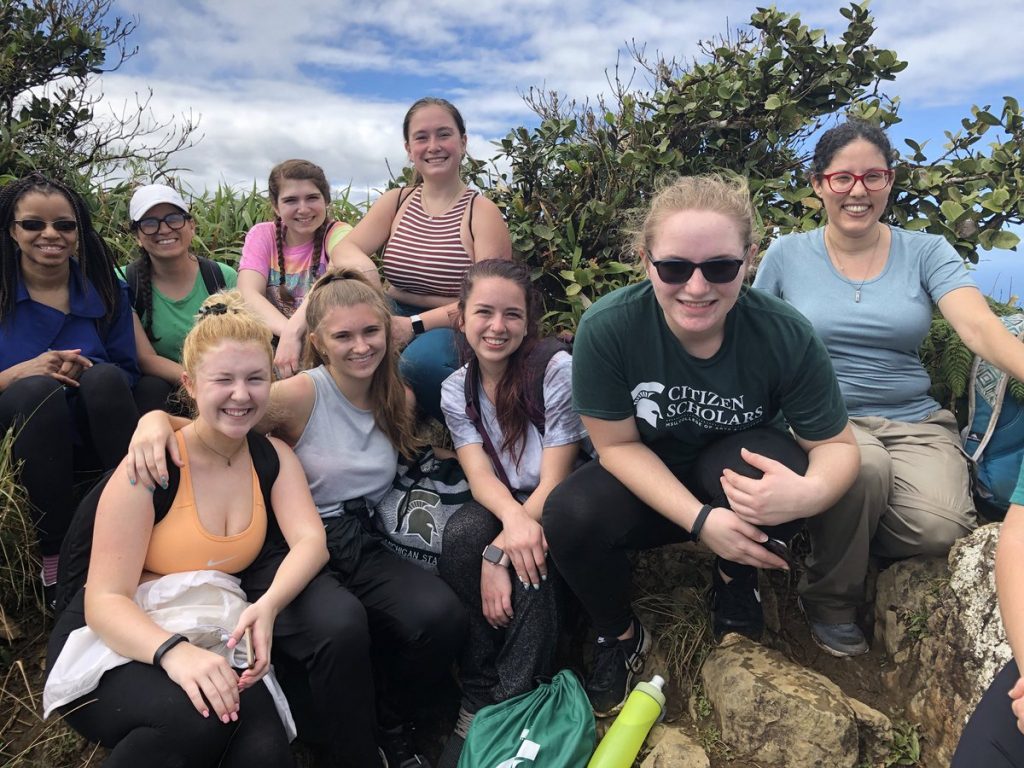
A group of MSU students, including nine Citizen Scholars from the College of Arts & Letters, recently traveled to Puerto Rico for a weeklong study away trip where they gained a deeper understanding of Puerto Rico’s culture, its rehabilitation efforts post-Hurricane María, and its vexed colonial and territorial relationship with the United States.
The trip was an extension of Assistant Professor of English Yomaira Figueroa’s AL 210 course, Colonial Disasters & Resistance: Puerto Rico’s Present Past 1898-2018, and was led by Associate Professor Estrella Torrez from MSU’s Residential College in the Arts and Humanities and Rutgers University-Newark American Studies doctoral candidate Keishla Rivera.
“The Citizen Scholars program benefited me with the amazing opportunity to study away this semester,” said Maria Chodnicki, freshman Citizen Scholar and Graphic Design major. “It is one thing to learn and read about a place or to see pictures, but it is a completely different thing to really go to that place and see it with your own eyes. We got to meet great, welcoming people who shared their experiences about their culture while we were surrounded by it.”

Figueroa’s AL 210 course covered the history of imperialism and anti-colonial resistance in Puerto Rico and its diaspora, beginning with the Spanish American War and ending with the impact of, and responses to, the 2017 Hurricane María in 2017. Students in the class examined how the arts and humanities are critical components to social, political, and cultural organizing and learned about grassroots political and recovery organizing happening on the ground in Puerto Rico and in the diaspora.
In order to organize the study-away trip, Figueroa partnered with Salon Literario Festival de la Palabra, the organization that runs the largest literary and literacy festival in the Caribbean. The Director of Festival de la Palabra, Mayra Santos Febres, also visited the MSU campus as part of the Womxn of Color Initiative Project last month to connect with the MSU and Lansing community.
“Together with the intercollegiate research team #ProyectoPalabrasPR, which traveled to the island after the hurricane to work with grassroots organizers, these efforts represent a strategic partnership between the College of Arts & Letters and Puerto Rican artists, activists, and organizers that we hope will be ongoing,” Figueroa said.
It is one thing to learn and read about a place or to see pictures, but it is a completely different thing to really go to that place and see it with your own eyes.
MARIA CHODNICKI, FRESHMAN CITIZEN SCHOLAR AND GRAPHIC DESIGN MAJOR
In addition to the nine Citizen Scholars, the trip also included three students from the Residential College in the Arts and Humanities. The group participated in activities that helped braid together how notions of race, culture, and gender affect the livelihoods of Puerto Ricans post-Hurricane María and in their everyday lives.
Students participated in writing workshops with the Cultural Institute of Puerto Rico, a book tour with El Archivo General de Puerto Rico, and a walking tour of the colonial city of Old San Juan. They also hiked across the El Yunque rainforest and visited Afro-Puerto Rican artists from a myriad of disciplines who taught the students how their Black roots influence their work, ranging from bomba dance classes, a plena music class, art studios, and museums.
“The biggest take away from the trip was seeing how, despite so much tragedy for Puerto Rico, they are still rising,” said Rebecca Hallman, a freshman Citizen Scholar and English major who went on the trip. “The people on the island continue to work hard to rebuild their home.”

The students learned about the United States’ colonial impact on Puerto Rico, especially regarding post-Hurricane María rehabilitation efforts. The group visited areas of the island that hadn’t been rebuilt since the hurricane and discussed the inequity of allocated resources to the island.
“One of the individuals who shared her time with us shared that when certain countries sent resources to Puerto Rico, the United States wouldn’t allow them, so they had to return them,” Torrez said. “We talked about the colonial impact and what that looks like. People might not understand the relationship of a territory with a country and what that looks like after something as horrible as Hurricane María.”
The trip also showed students the strength of women as it is the women who are leading the effort in rebuilding the island and most of the organizations that the group met with were led or started by women.

“The trip focused on how we can support these women despite culture, linguistics, and class difference,” Torrez said. “Seeing the tremendous work that the women across the island are doing and having a group of women on the trip whose previous experiences are so different come together and learn from one another was really impactful.”
The Citizen Scholars on the trip were able to apply their knowledge of Puerto Rican politics, society, and culture from Figueroa’s course by curating a lens of social justice while witnessing community activism and mobilization efforts post-Hurricane María.
“Almost everything we did was engage with local organizations doing grassroots efforts to bring awareness and action to improve what happened post-Hurricane Maria,” Torrez said. “One of the biggest takeaways of the trip was thinking about how people in the United States don’t often think about what’s happening in Puerto Rico and how the media has been very quick to gloss over what happened there.”
Written by Annie Dubois


